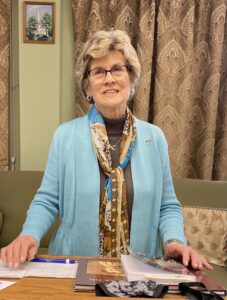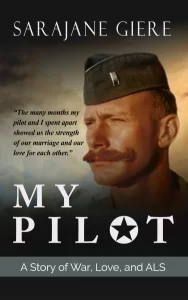Sarajane Giere is a remarkable and versatile writer who has had essays published in The Christian Science Monitor and the Long Island section of The New York Times. She has had devotional pieces published in Son-Rise Publication, Bethany House Publishers. Her two published book-length memoirs are
The Melody Lingers On, and My Pilot, A Story of War, Love, and ALS.
The Melody Lingers On, a portrait memoir of her grandparents, congressman and raconteur Bill Nolan, his wife Matea, and their nine daughters paints a vibrant portrait of life in the mid-19th century including the politics, theater, song, the traveling lecture circuit, the broken hearts, and joyous antics of that side of the family.
My Pilot, A Story of War, Love, and ALS won three literary awards which included the Independent Press Award, The Military Writers Society of America’s Silver Medal Award, and the NYC Big Book Award. Sarajane Giere wrote the book based on the handwritten letters from Bernie and her own personal accounts of what life was like being a military wife. The book, which contains photos of her and Bernie over the years, is a loving tribute to her 52–year marriage to her late husband Bernie, a military hero who served in the United States Air Force during the Vietnam War. Sarajane recounts the loneliness of separation from her husband when he left for his tour of duty, the worries experienced while he was gone, the bonding which occurs between military families, and the horror and fears when Bernie, who flew 214 combat missions in Vietnam, had been shot down and then rescued by a military helicopter. She explains how she struggled to find faith and gained the support of family and friends to get through those times, the relief and joy upon Bernie’s return home, and their life of raising children. Through vivid details, she describes Bernie’s courage under fire and his heroism during his twenty-five years in the Air National Guard’s 106th Rescue and Recovery Wing. It tells about how the couple’s faith, and their love helped them through the challenging times of wartime, then how Bernie began a career as an international commercial pilot with the uncertainty of furloughs while flying for Pan Am, and later his battle with ALS, a progressive neuro-muscular disorder, which he courageously fought but unfortunately, succumbed to.
Interview:
- Why did you become a writer?
SG –
As far back as elementary school, I enjoyed writing stories and illustrating them. My parents liked to read, and sometimes my mother would read passages aloud to me which would feed my imagination. Miss Helen Fox, my 6th grade teacher, didn’t laugh when my friend and I told her we wanted to write a novel like the one my mother was reading, about the wild West. Miss Fox let us do it. She moved our desks into the hall during recess time and was a gentle editor which propelled us to continue. All through school, I was fortunate to have teachers who encouraged me with my writing, and it made me happy to know my talent was recognized.
After I married and had children, I showed my oil paintings in an East Hampton Gallery and completed my MS degree in 1982. Art was my passion. Shortly thereafter, at age 42, I became a reading teacher and taught art after school. One day, a fellow teacher noticed me writing away in the computer lab during my lunch hours. She recommended I try out a writing group in East Hampton, and I did. That is when I began to seriously consider myself a writer. My group members encouraged me to publish, and I sent in my “lunchtime” essay to the Christian Science Monitor, and they published it! I was elated. My peers recommended I attend the Bread Loaf Writers’ Conference in Ripton, Vermont. I applied and was thrilled they accepted me. That’s where I found myself working with a well-known writer as mentor, Nancy Willard, who encouraged me to write a book.
2. What inspired you to write your book My Pilot?
SG –During one of my East Hampton writing group sessions, I read a piece I had written about the night my husband Bernie left for Vietnam, and how I felt about saying goodbye as an Air Force wife in that unsettled time in our history. None of my fellow writers had been close to anyone who fought in that war, and they loved my piece. They wanted to know more about Bernie and me, so I continued to write the memoir pieces which later became chapters for the book My Pilot, A Story of War, Love, and ALS.
When I moved to New Jersey to be closer to my children the year after Bernie died, in 2014, I joined the Write Group of Montclair. This new assembly of talented people encouraged me to keep on going with my Bernie memoirs. They were, and still are, supportive of my writing goals.
As I settled into my New Jersey home I came across Bernie’s many letters from the Vietnam War and his sojourn in Okinawa the year before. I reread them all and slid them into plastic sleeves for safe keeping. It was as if Bernie were there in the room with me, and I wanted to capture him on paper and let my grandchildren know what a wonderful and brave man their grandfather was throughout his life. I found the letters gave the essence of the man and conveyed the feelings that he probably wouldn’t have shared under ordinary circumstances. I set to work, and although I wasn’t aware of it at the time, writing My Pilot assuaged my grief and gave me a love fest of gratitude that made each new day a joy. I was falling in love again and it felt good.
3. How much time does it take for you to write a book?
SG – It took me four years to write My Pilot.
4. How did you first get published?
SG –
I met a wonderful editor through my writing group, named Lorraine Ash and asked her if she’d look at my 24 chapters and give me some advice about publishing, of which I knew very little at the time. She helped me with suggestions for the development of the book and suggested that I leave off the first four chapters which were about Bernie’s parents, and make the book about just Bernie and me, and so I did. Lorraine helped me line edit and complete the rest of the publishing journey. We found several small publishers who were interested in my memoir and chose Imzadi Publishers who followed through and brought out the book in November of 2020. Lorraine even led me to a lawyer to review the contract they offered me.
5. What are you working on now?
SG – I am doing research on my dad’s family from Missouri, the Palmers. Like my first family memoir in 2012— about my mother’s Minnesota family—the Palmer memorabilia comes with plenty of diaries, letters, and memoirs to inspire me. I’m writing about what it was like growing up on a Missouri farm beginning in 1886, and how my grandfather John W. Palmer, became such a successful and respected gentleman who produced a notable family whom I remember with gratitude and affection. Using love letters and memoirs from my grandparents, my portrait memoir is the story of their lives and the lives of their children, as seen against historical times. It makes me happy and grateful to the Palmers for letting me behind the scenes of their remarkable story. My grand kids will know more about themselves after they read about the ones who came before them.
6. Can you describe your writing process?
SG – I arise early and make a schedule for the day. I try my best to stick to it, but sometimes life gets in the way. A three, or four-hour session of writing is the most productive for me. I write for the book, and my blog, and, also to get feedback from my fellow Write Group members with whom I meet every two weeks on Zoom.
7. What writing organizations are you in?
I belong to the Write Group of Montclair, New Jersey. In the past, I was one of the founders of the Long Island Children’s Book Writers & Illustrators Group, and was a member of a Christian writing group, in Riverhead New York, called the Writing Circle. Before that, I joined the East Hampton Writers and met with them weekly for two years.
8. Where are your books available?
SG – My Pilot is available on Amazon, in paperback, large print, audio and e-book and can be ordered at Barnes & Noble, Kobo, and Walmart. The Melody Lingers On is available from the Blurb.com. bookstore and is also linked-in on my website’s “books” page.
Love is a Verb, a Devotional of 365 Daily Inspirations to Bring Love Alive, compiled by Gary Chapman and James Stuart Bell, is available on Amazon.
For more information on Sarajane Giere, click the link below.
EXCERPTS
My Pilot, Chapter 4: Off to War
Everything was soggy that night in Tampa when we pulled up to the MacDill Air Force Base flight line. A big plane revved up.
“That’s our taxi, Old Shaky,” said Bernie, pointing to the C-124 transport. “But don’t worry, honey. Each of those four engines generates about 3,800 horsepower, so you can be sure we’ll get there in one piece.”
The behemoth was waiting to transport my husband and the other pilots of the 557th Tactical Fighter Squadron to the South Vietnamese Air Force Base at Cam Ranh Bay on the South China Sea.
These F-4C Phantom fighter pilots of the 12th Tactical Fighter Wing would be the first to update the old airstrip on the sand into a modern air base. Runways were being laid, barriers to protect the aircraft created, and Quonset huts dressed up for pilots’ quarters. For eight years, until the conflict ended, the base would serve as a staging point for planes flying missions in South and North Vietnam. But that night Bernard and I didn’t question how long the war would last; that would come later.
The pilots had twenty minutes before takeoff when we ducked into the Flight Line Café where the men and their wives occupied every table. The jukebox boomed out the We Five rendition of “You Were On My Mind.” I felt uncomfortably adrift on the waves of all the smoke. The colonel had passed out cigars that morning. I chuckled when I saw a few nonsmokers playing at smoking. Those fighter pilots must have thought their cigars signified something—perhaps notoriety for being in the first unit to arrive at Cam Ranh Bay?
All these fliers, most not yet thirty, were going to test their mettle at last. After a year at MacDill Air Force Base, they had become such a tight group that even their nicknames took on a greater significance. In pilot training Bernard’s flight instructor sat with his trainees around him. When he called on twenty-four-year-old Giere, he said, “Bernard? Huh. That name will get in the way. How ’bout Ben?” The name stuck.
Jim and Sandi, sitting next to the window, motioned for us to join them. Outside the rain drummed on as we made our way to them, past couples leaning across tables, holding hands, and speaking in low tones as if sharing secrets. I was relieved to sit down.
“Ben, this is the best stogie I’ve ever had,” Jim said. I remembered I’d left Bernie’s in the car. When I offered to get it, he held me back with a smile.
“Forget it, honey,” he quipped. “I’ll get it later.”
Jim passed his cigar over.
“Take a drag of this,” he insisted. Ben accepted. Jim would be his copilot, or Guy in the Back Seat, for most of their tour. Their friendship had been cemented a year earlier when they were deployed in Okinawa for three months.
From the way Jim and Bernard talked, the three-day ride to Cam Ranh Bay was going to be the worst part of their twelve-month tour. There’d be no first class or stewardesses on Old Shaky.
“Please, ladies,” we’d been told, “the colonel says not to divulge our destination to anyone. It’s a military secret.”
We were supposed to say, “He’s been deployed to Southeast Asia.”
And oh yes, Sandi and I each had a two-year old daughter to keep us company. Both Lisa and Christy were to be big sisters in six months’ time.
“I’m going to call my son Jamie,” Jim said. How presumptuous!
“How can you be so sure it will be a boy?” I asked.
“Sandi and I worked it out,” he boasted. “Didn’t we, Sandi?”
I thought it was impossible to work out a baby’s sex in advance. Four of us squadron wives were pregnant. The only predictor we ever talked about was the silly needle on a string game, and that was only a fortune teller’s ploy. I turned to Sandi for their secret.
“I’ll tell you later,” she mouthed.
After hearing Jim’s announcement, Bernie’s face lit up with a grin.
“I have no preference, really,” he said, “as long as it’s healthy.”
He put his hand around my shoulder and gave it a squeeze. That sweet touch radiated through me and filled me with pride. I knew he was telling the truth. Had there ever been a more thoughtful husband?
I looked through the windowpane at the wavy silhouettes of airmen loading duffel bags onto a plane. Ten minutes to go.
Our table conversation seemed inconsequential, just words lost in the air. I prattled on, merely dancing around The Fear—the fear of separation, of his capture, of his death, of widowhood. Fear of that day when a blue staff car would pull into my driveway and the base chaplain and grievance officer would ring the bell.
That very drama had recently happened to my neighbor, Nancy. Her husband had been one of the first Forward Air Controllers (FACs) sent to Vietnam. FACs flew small, commercial-type airplanes over the treetops, scouted for targets, and then relayed their positions to the F-4s, which were above them and poised to strike. (Bernard had been to FAC training that summer, even though his position as an F-4 pilot was secure. He never refused an opportunity to master something new.) As Nancy arrived home with her three little boys and a trunk full of groceries, she saw that bold blue staff car in her driveway.
The official word of Coz’s death came from the commander’s wife. I took the lead from her on when to visit and what to bring. I didn’t know what to say to Nancy, or if my voice would hold up through my tears. Somehow I got through it and the funeral that followed.
After that the vulnerability of a pilot’s life became a reality that helped define my role in this new war experience. My friends from the past, who carried on their civilian lives as if there were no Vietnam, seemed disconnected, foreign. I thought of Bernard as Teddy Roosevelt would have: “The credit belongs to the man who is actually in the arena … who strives valiantly.”
The café door opened suddenly. The loadmaster waddled in, his boots puddling the linoleum. He grabbed the nearest coffee cup and gulped it.
“Let’s go!” he shouted. “Now or never.”
Bernard shouldered his bag and we left the café. With his hand around my waist, he steered me to a private spot near the runway gate. The rain was lessening. The wing tip lights blinked. Too soon, the pilots began peeling away from their wives and heading toward the plane. Bernard pulled me to him.
“I love you, honey,” he said. “Everything’s gonna be alright. My mother will fly down to help you when the baby comes.”
His embrace never felt as precious—strong, familiar, comforting. I wanted to say something substantial, some words of reassurance, but I couldn’t.
“Write soon,” I said. “I love you. Be safe.”
When I squeezed back into the car and noticed the dark shape on the dashboard, I lost it. Oh, oh, I forgot to give him his cigar. Oh honey, I’m sorry. While some wives stood watching Old Shaky take off, I sat in the car groping for something to catch my tears. I drove slowly toward home, not wanting to spoil the memory of us together.
By the end of the week, the realization had set in. I knew this drama wouldn’t have a pat ending like an old war movie. I figured that if I could make it until November 1966, Bernard’s date of return, I could survive anything
********
Excerpt taken from Chapter 3
from The Melody Lingers On
On September 2, 1901, four days before President McKinley was shot by an assassin, the vice-president and soon-to-be President, Teddy Roosevelt, attended the opening of the Minnesota State Fair. Bill Nolan probably went to hear him speak, as he was a fan of the popular 43-year-old politician. That was a speech to remember, one in which Roosevelt uttered the words that lived long after he was gone: “There is a homely adage, which runs, speak softly and carry a big stick: you will go far.”
Roosevelt and Nolan most likely talked about their growing families and the frustrations of raising strong willed daughters. Could it be that the Nolan girls and Alice Roosevelt had the same streak of defiance and independence? “I can be president of the United States, or I can control Alice. I cannot do both,” Roosevelt said.
When Bill told the president that his wife was pregnant again, Roosevelt said that if it were a boy, Bill should name him Theodore. A girl—if that unlikely event should occur—should be called Omega, the seventh and the end.
When the legislature convened in January of 1905, the members passed an official looking resolution and presented it to their Speaker of the House, Bill Nolan, which stated that the seventh Nolan shall be the last and he should be called, Theodore.
The members had a silver locket struck, engraved with the Greek letter Omega, and presented it to Mrs. Nolan.
Three months later, the seventh Nolan daughter was born, and they named her Theodora Antionette. Many years later, to receive her social security benefits, my Aunt Teddy proved her eligibility by showing her gold embossed resolution and silver locket.










